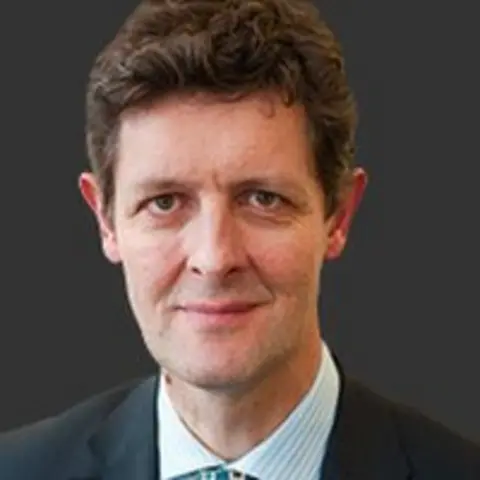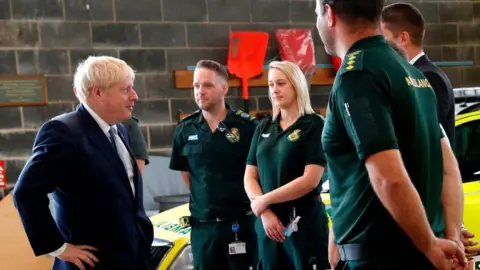NHS 'reality check' for PM Boris Johnson

 Getty Images
Getty ImagesThere has been a string of health announcements for England this week - funding for new buildings and equipment, a deal to sort out doctors' pension tax problems, and a new artificial intelligence lab.
And Whitehall sources make clear there will be more to come when MPs return from their summer holidays next month.
In his first NHS policy initiative, Boris Johnson said it was his "mission" to reduce the time people waited, both to see a GP and in accident and emergency units.
It is understood that he sees the NHS as a priority in his first months in office and is attempting to seize the initiative ahead of a possibly imminent general election.
But the latest statistics on the state of the NHS in England serve as a reality check for the new prime minister and his administration.
Hospital strain
Record numbers (2.27 million) came through the doors of A&E units in England in July, up 4% on the same month the previous year.
The heatwave was given as one reason, but the underlying story is unchanged, which is worrying for health service leaders. Their aim has been to get more people treated away from hospitals in their local communities. But the opposite is happening as more patients, some frustrated by difficulties getting GP appointments, are turning up at A&E and putting more pressure on hospitals.
There were just over 554,000 emergency admissions to hospitals in July - the third highest monthly figure since modern records began and, what's more, in the middle of summer.
More strain on A&E and more demand for urgent hospital care puts the squeeze on bed capacity.
One major hospital reported being full. The result is that patients waiting for non-urgent surgery experience longer delays.
The total waiting list in England has hit a new peak of 4.4 million. The number of patients waiting more than the 18-week target for routine operations and procedures has gone above 600,000 for the first time in a decade.
The data will make sobering reading in Downing Street.
Turning around NHS performance is a big ask.
The cash boost for the front line this year, the first part of the five-year plan announced by Theresa May, has helped. But, as many analysts predicted, it has been barely enough to keep up with the increased demand for patient care, let alone reverse the backlog of operations or improve the A&E numbers.
The Royal College of Surgeons says nothing short of a long-term plan to increase the number of beds and staff and resources to run the wards will suffice.
Mr Johnson announced his own £1.8bn funding increase for the NHS, but for hospital buildings and equipment (the capital budget) rather than day-to-day spending. So was it new money? That question has been hotly debated.
'Like finally giving back the £10 you borrowed'
Of that package, £850m is new in that it will be provided over five years by the Treasury to fund 20 hospital upgrade projects and had not been announced before. Much of the other £1bn actually comes from surpluses built up by hospitals in earlier years, which they were not allowed to spend at the time.
That bar has now been lifted by the Treasury, which has given the green light for the hospitals to spend the money this year. So it is not new cash, in the sense some members of the public might understand it. But it is funding which is newly available to the NHS.
Sally Gainsbury, of the Nuffield Trust, was the first analyst to highlight the funding mechanism. She argued that "to claim this as new money is a little like finally giving back the £10 you borrowed some time ago - and expecting to be applauded wildly".
 Getty Images
Getty ImagesHowever, the prime minister and health secretary continued to insist the £1.8bn was new money.
The argument, according to sources, was that the funding had not been previously accessible and that the government announcement had freed it up to spend on improving hospitals. Chris Hopson, chief executive of NHS Providers, tactfully concluded that both Ms Gainsbury and the government were correct.
The result of the latest announcement is that the capital spending assumption for the current financial year in the Department of Health and Social Care accounts has been raised by £1bn.
Whatever the argument about the nature of the funding in England, the devolved administrations will receive new money as a result of the usual mechanism (the Barnett formula applied to the £1.8bn package), amounting to a total of £350m for Scotland, Wales and Northern Ireland.
This may sound like an arcane wrangle over dry-as-dust accounting practices.
But with a general election possibly not far off, it is important.
Statements about where money is coming from and how it is spent will rightly be closely scrutinised, as will performance figures from the NHS front line.
